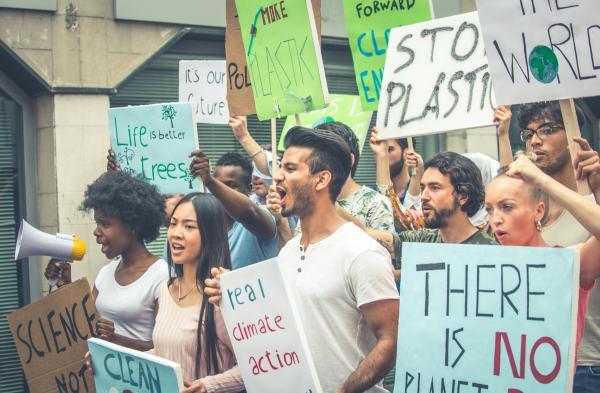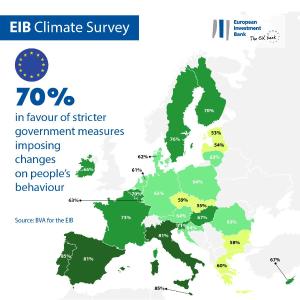
The first part of the 2021-2022 EIB Climate Survey explores people’s views on climate change in a rapidly changing world. The results from this release focus on citizens’ perceptions of climate change and the actions they expect their country to take to combat it.
- 79% of people in the Benelux countries think that climate change and its consequences are the biggest challenge for humanity in the 21st century (EU average: 81%)
- 66% believe that they are more concerned about the climate emergency than their government (EU average: 75%)
- 64% feel that climate change has an impact on their everyday lives (EU average: 77%)
- 65% are in favour of stricter government measures that impose changes on people’s behaviour (EU average: 70%)
- 67% would welcome a tax on products and services that contribute most to global warming (EU average: 69%)
- 63% think the country will fail in drastically reducing its carbon emissions by 2050, as pledged in the Paris Agreement (EU average: 58%)
- 87% say they want to replace short-distance flights by fast, low-polluting trains in collaboration with neighbouring countries (EU average: 87%)
79% of people in the Benelux countries think that climate change and its consequences are the biggest challenge for humanity in the 21st century. There is a marked difference among people with different political views: 90% of those with left-leaning political views say that climate change is the biggest challenge for humanity in the 21st century, compared to 69% of those with right-leaning political views.
The vast majority of people in the Benelux countries (64%) feel that climate change has an impact on their everyday lives (13 points below the European average of 77%).
However, this apparent consensus hides significant gaps between different groups of the Benelux population. Very diverse levels of concern and expectations on the topic of the climate can be seen among younger and older citizens, among people who have left-leaning and right-leaning political views, among men and women, and across different socioeconomic categories.
These are some of the results from the first release of the 2021-2022 Climate Survey published on 27 October by the European Investment Bank (EIB). The EIB is the lending arm of the European Union and the world’s largest multilateral lender for climate action projects.
Perception of the climate crisis: The country’s fight against climate change
The vast majority of people in the Benelux countries (64%) feel that climate change has an impact on their everyday lives. While this is particularly marked among 15-29 year-olds (73%), this figure drops 14 points (59%) for people older than 64. 70% of people who have left-leaning political views say they feel this impact in their everyday lives, which is 11 points higher than for those who have right-leaning political views (59%).
66% believe that they are more concerned about the climate emergency than their government. As a consequence, they are fairly pessimistic regarding their country’s capability to undergo an ambitious green transition. Only 37% think that their country will succeed in drastically reducing its carbon emissions by 2050, as pledged in the Paris Agreement. The majority (63%) think that the Benelux countries will fail to meet their reduced carbon emission targets. The generational gap here is noticeable, with a 15-point difference between people younger than 30 (46% of them believe the Benelux countries will succeed) and people older than 64 (31%). 69% of people over 64 believe the Benelux countries will actually fail to meet the 2050 deadline. 54% of 15-29 year-old respondents share this pessimism. This pessimism is fairly consistent among respondents of all political views (66% of people with left-leaning political views and 60% of respondents with right-leaning political views). 49% of respondents in the Benelux countries with children under 18 think their country will succeed in reducing its carbon emissions, while this figure decreases 17 points (32%) for respondents without young children.
As a consequence, almost two-thirds (65%) of people in the Benelux countries are in favour of stricter government measures — similar to the ones implemented to combat the COVID-19 crisis — that would impose changes on people’s behaviour (five points below the EU average of 70%).
Meanwhile, only 4% of people in the Benelux countries who have left-leaning political views believe that global warming is not due to human activities, which is ten points below the figure for people with right-leaning political views (14%). Furthermore, 23% of people in the Benelux countries who have far-right political leanings are still sceptical about humans being the main cause of the climate crisis.
The energy debate
When asked about the source of energy their country should rely on to fight global warming, nearly half of people in the Benelux countries favour renewable energies (49%, 14 points below the EU average of 63%) to address the climate emergency. People in the Benelux countries with left-leaning political views support renewables more strongly than those with right-leaning political views (60% compared to 42%, a difference of 18 points).
People in Benelux overall are slightly more supportive of nuclear energy than other Europeans (18 % vs. 12%). People older than 64 (22%) are slightly more in favour of nuclear energy than people younger than 30 (17%), but the gender gap is more evident: men (26%) are much more in favour of nuclear energy than women (11%). People with right-leaning political views in the Benelux countries are much more in favour of the development of nuclear energy (29%) compared to those with left-leaning political views (13%). People with higher incomes are also more in favour of the development of nuclear energy (25%) compared to those with lower incomes (15%).
Finally, saving energy to tackle climate change is ranked far above an increased role for natural gas (21% vs. 7%). Respondents over 64 in the Benelux countries are particularly in favour of energy savings (21%). This figure is six points higher than for respondents younger than 29 (only 15% would prioritise saving energy). The gender gap in energy savings is also noticeable: women (27%) are much more inclined to support energy savings than men (16%).
Most popular solutions to fight climate change among people in the Benelux
The majority of people in the Benelux countries (67%, two points below the EU average) would support the introduction of a tax on products and services that contribute most to global warming. Even among respondents with lower incomes, 67% would be in favour of such a tax. People in the Benelux countries are also in favour of a 5-year minimum warranty on any electric or electronic product (89%) and replacing short-distance flights with fast, low-emission trains (87%). They also favour softer measures like strengthening education and increasing youth awareness of sustainable consumption (90%).
EIB Vice-President Kris Peeters said: “Perhaps contrary to what is often seen in the media, the majority of people in the Benelux countries are asking for stricter measures and instruments from the government to help them fight climate change. In the run-up to the COP26 climate summit, it is important to step up our efforts and accelerate the green transition. In the Benelux countries also, the EIB is ready and willing to support ambitious new climate projects, especially innovative projects with a high beneficial impact for citizens.”
--
Download the Excel spreadsheet with the raw data for all 30 countries surveyed here. Please click here to access the EIB website that presents key findings of the EIB Climate Survey IV
Background information
About the EIB Climate Survey
The European Investment Bank has launched the fourth edition of the EIB Climate Survey, a thorough assessment of how people feel about climate change. Conducted in partnership with market research firm BVA, the fourth edition of the EIB Climate Survey aims to inform the broader debate on attitudes and expectations in terms of climate action. More than 30 000 respondents participated in the survey between 26 August and 22 September 2021, with a representative panel for each of the 30 countries polled.
About the European Investment Bank
The European Investment Bank is active in around 160 countries and is one of the world’s largest multilateral lenders for climate action projects. The EIB Group has recently adopted its Climate Bank Roadmap to deliver on its ambitious agenda to support €1 trillion of climate action and environmental sustainability investments in the decade to 2030 and to deliver more than 50% of EIB finance for climate action and environmental sustainability by 2025. As part of the Roadmap, all new EIB Group operations have also been aligned with the goals and principles of the Paris Agreement since the start of 2021.
EIB at COP26
The EIB will be present with a stand in Hall 4 of the Scottish Event Campus and will run a series of side events on numerous topics. You can find the full agenda here.
About BVA
BVA is an opinion research and consulting firm recognised as one of the most innovative market research firms in its sector. Specialised in behavioural marketing, BVA combines data science and social science to make data inspiring and bring it to life. BVA is also a member of the Worldwide Independent Network of Market Research (WIN), a global network of some of the world’s leading market research and survey players, with over 40 members.

©EIB
Download original

©EIB
Download original

©EIB
Download original